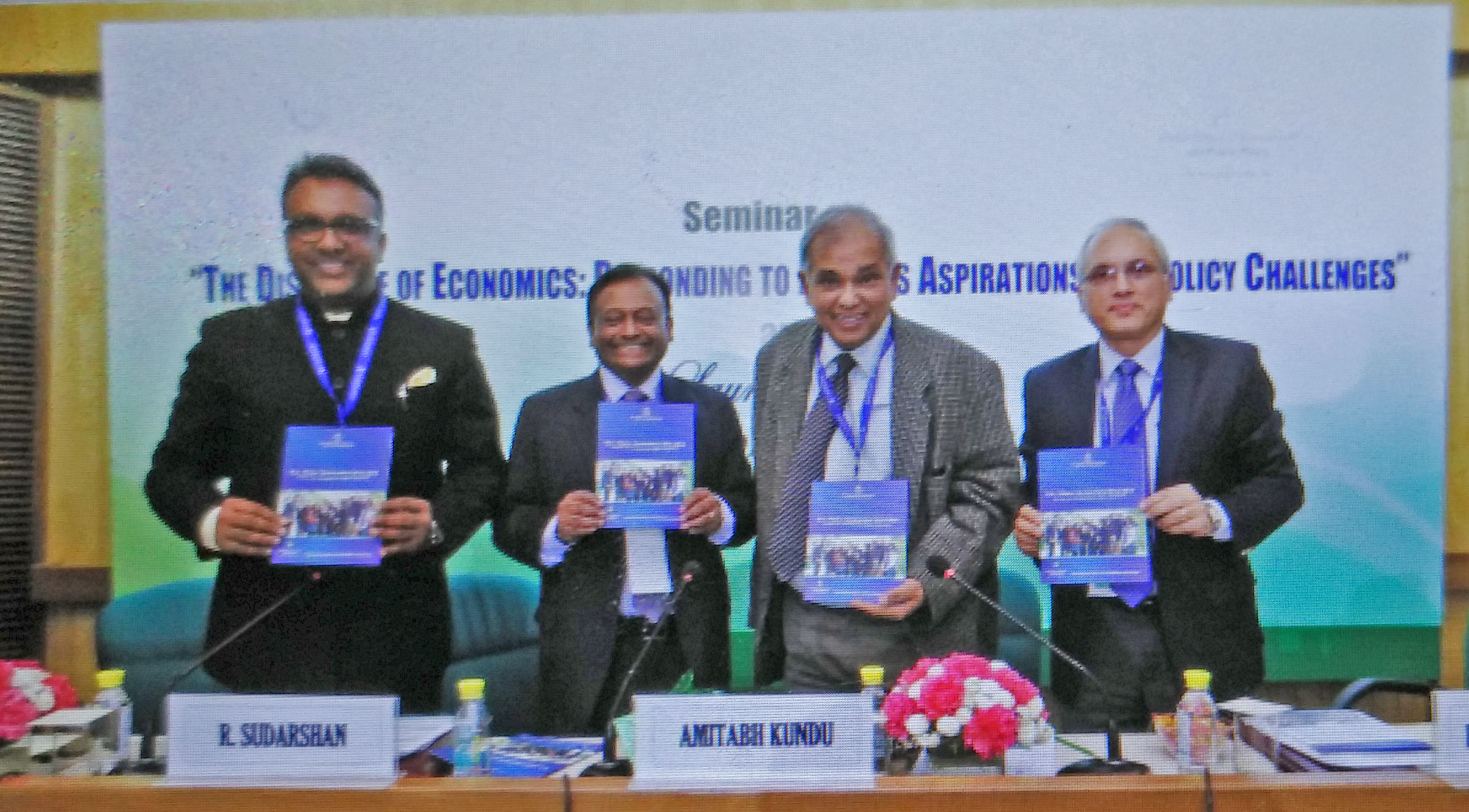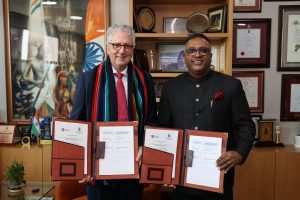The 2008 financial meltdown started a conversation among mainstream economists about what’s ailing the free market system. It sent ripples within economic departments in many universities. As a ‘first of its kind’ initiative in India, the Jindal School of Government and Public Policy announced today the launch of a new B.A Honors in Economics programme with the professed goal to “Explore Paradigms and Possibilities in Economics”.
At a gathering of distinguished academic economists and policymakers, the Vice-Chancellor of Jindal Global University, Professor (Dr.) C. Raj Kumar reflected on the question of why the world needs another undergraduate programme in a discipline that has been variously described as the ‘dismal science’ or an imperialist among the social sciences.
He said, “At a time when recessions and financial crises and energy price fluctuations have become commonplace occurrences, it is obviously imperative to have the skills and tools to understand and participate meaningfully in various forums and on difference dimensions of policy making, either to advance human welfare or to confront challenges and risks to security and well-being of people. The curriculum of B.A Honors programme is being thoughtfully designed to enhance understanding of modern economic theory while instilling in students a capacity for independent thinking on diverse economic issues at the local, national and global level.” he noted.
Delivering the keynote address, Dr. Amitabh Kundu, Senior Fellow, Delhi Policy Group and former Dean, School of Social Sciences, Jawaharlal Nehru University, said, “The crash of Lehmann Brothers that snowballed into a major global crisis challenged the fundamental paradigm and ideological framework of economic theory. The situation also highlighted the failure of economists to anticipate a crisis of monumental proportions, pointing to a certain complacency and even arrogance about their knowledge on the part of economists who could foresee and possibly avert similar situations.”
Prof. Kundu welcomed the effort to devise a new curriculum for teaching economics with a greater awareness of economic history, better understanding of the real world, social context, more capacity to communicate with people from other disciplines, administrators, policy makers accompanied with using more simple models with transparent and verifiable assumptions.
In his view, a curriculum design that enables students to imbibe both historical and new age concepts related to mainstream economics addresses some of these challenges would be a welcome change, He further urged more modesty about applicability of results, predictions, sensitivity analysis with alternate parameters.
Dean Professor R. Sudarshan emphasized that the new B. A. Hons Programme offers a unique ecosystem for students. This means, firstly, the opportunity to learn about key insights and foundations of economics as a long and well-established discipline from outstanding teachers. Beyond benefitting from first-rate pedagogy in economics, students will also have the opportunity to interact with practitioners of public policy and with experts in other disciplines whose insights are imperative to understand human behaviour. Prof. Sudarshan underlined that among the skills that students enrolled in the economics honours programme can acquire will be the ability to think critically and ask the right questions and make good judgements about applicability of models and theories in different contexts. The course will equip graduates to advance the frontiers of the discipline, uncover fresh paradigms and open up new possibilities, by building on accomplishments and received wisdom already encapsulated in mainstream economics.
One of the strengths of JSGP, part of the O.P. Jindal Global University, is the excellent combination of policy professionals and practitioners and world class multidisciplinary and interdisciplinary scholars. JSGP faculty include economists of international repute in different branches of the subject, besides outstanding scholars in the fields of law and governance, social and cultural theory, urban politics and policy, political movements, environment and climate change policy, and strategic policymaking.
This faculty has the advantage of having been trained in some of the world’s best universities, well equipped to inspire and challenge young minds to think deeply and widely about various aspects of policy making with a solid grasp of economics.
At the B. A Economics launch event, Prof. Parkash Chander, currently at JSGP (formerly Head of Indian Statistical Institute, Delhi), began his remarks with a humorous quip “Economists are interesting people both because of their skills and because they can talk of many things: Of shoes- and ships- and sealing wax – Of cabbage and kings– And why the sea is boiling hot — And whether pigs have wings”. And indeed, what makes the subject matter of economics so compelling is perhaps the diversity of issues that it addresses and engages with.
Prof. Chander, who is also a fellow of the Econometric Society, spoke about the necessity of developing a strong quantitative tool kit in order to make sound economic policy judgements. With a comprehensive skill set, which the new B. A. Economics honours curriculum intends to impart, students are not only ready to pursue a career as professional economists in industry, government, or management consultancy, but also in other financial occupations and managerial occupations. The programme keeps in mind the possibility of students taking up alternative career paths after studying economics, and as a result engages in a diverse set of intellectual pursuits.
Prof. Rajeev Malhotra in the JSGP faculty, an eminent applied economist, who has authored a pioneering India Public Policy Report, which contextualizes policy making through analytical and empirical lenses, said, “The B.A. Economics honors programme is aimed at a new problem-solving generation, a generation of young professionals who can reconcile the imperatives of ethics and philosophy with challenges of ecology and management.”
Key Highlights of the programme:
- Balancing theoretical grounding with skills for practical applications;
- Innovative study with leading scholars and academics at the university level
- Interdisciplinary learning environment with options to learn foreign languages
- Specialization in new and emerging areas within mainstream economics and beyond
- International student exchange, summer school and semester abroad possibilities
- Internship programme that exposes students to real life development and business contexts
- Training in research methods; quantitative and qualitative, and academic writing
- Platform for sharing student research and honing presentation skills.
The programme lays emphasis on acquiring knowledge and skills sets to undertake; quantitative as well as qualitative research; familiarity with basic data sets and under-standing of the Indian economy and its developmental challenges. The programme is taught by accomplished scholars and academics at the university level in an interdisciplinary learning environment.
The programme is a blend of core courses and electives that provide options to specialize in new and emerging areas of study within the mainstream economics and beyond, including development economics, political economy, finance, urbanization, environmental economics and informal economy.
About the Jindal School of Government and Public Policy
The Jindal School of Government and Public Policy (JSGP) aims to promote research that facilitates better understanding of issues relating to governance and public policy. The programmes that the Jindal School of Government and Public Policy offers bear in mind the contribution that the faculty and the students of the school can make towards meeting the challenges of governance and improving the efficiency of government in India, while drawing upon comparative and international perspectives. JSG intends to promote inter-disciplinary studies and joint teaching and research programmes in partnership with the schools of law, business and international affairs, Liberal Arts & Humanities.
About the O.P. Jindal Global University
JGU is a non-profit global university established by the Haryana Private Universities (Second Amendment) Act, 2009. JGU is established in memory of Mr. O.P. Jindal as a philanthropic initiative of Mr. Naveen Jindal, the Founding Chancellor. The University Grants Commission has accorded its recognition to O.P. Jindal Global University. The vision of JGU is to promote global courses, global programmes, global curriculum, global research, global collaborations, and global interaction through a global faculty. JGU is situated on an 80-acre state-of-the art residential campus in the National Capital Region of Delhi. JGU is one of the few universities in Asia that maintains a 1:15 faculty-student ratio and appoints faculty members from different parts of the world with outstanding academic qualifications and experience. JGU has established five schools: Jindal Global Law School, Jindal Global Business School, Jindal School of International Affairs, Jindal School of Government and Public Policy and Jindal School of Liberal Arts & Humanities.



